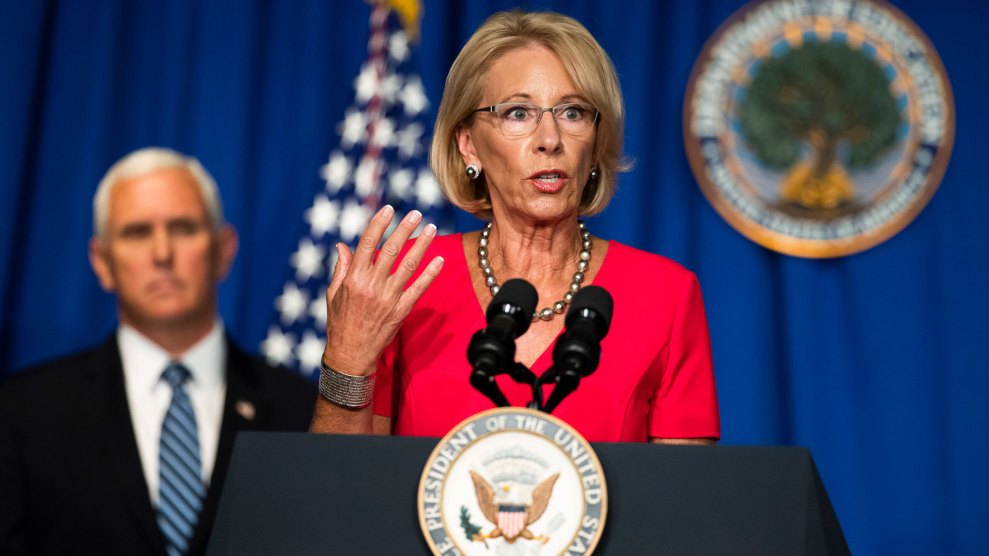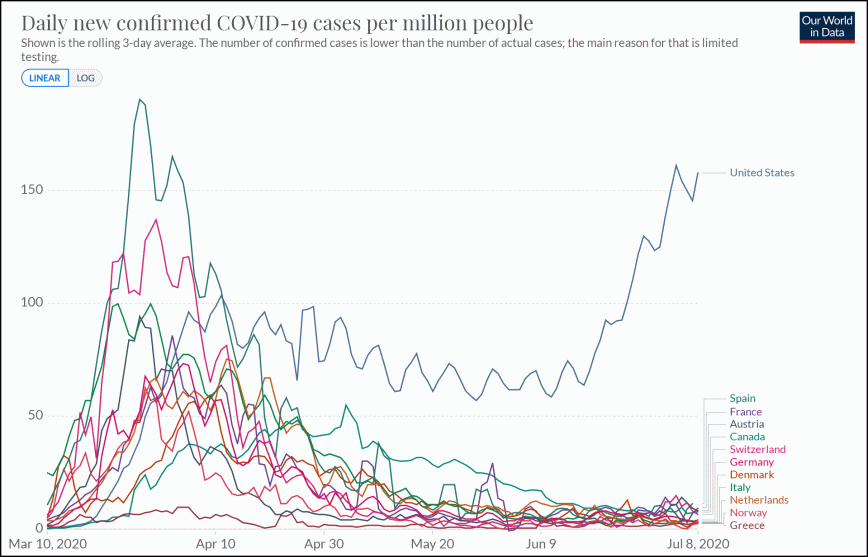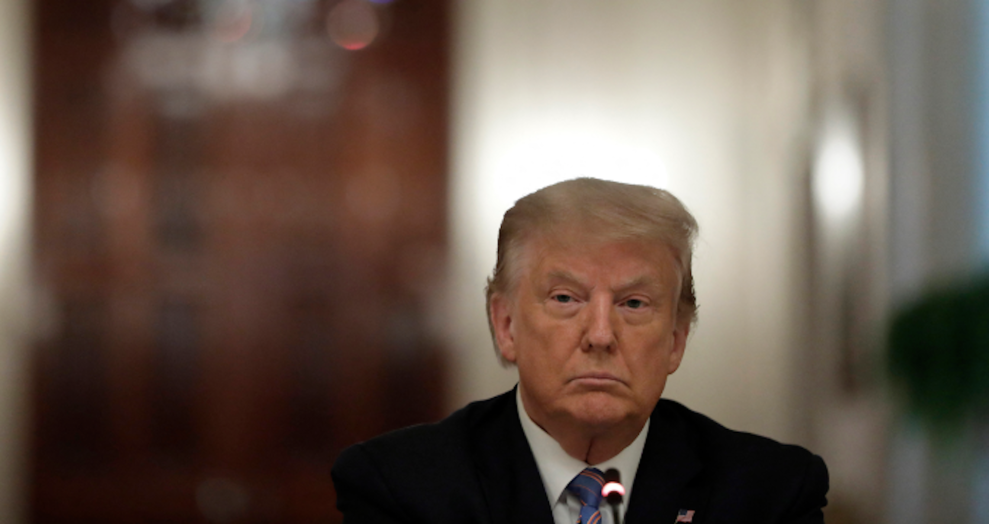
Education Secretary Betsy DeVos, with Vice President Mike Pence, speaks during a White House Coronavirus Task Force briefing at the Department of Education building Wednesday, July 8, 2020, in Washington. Manuel Balce Ceneta/AP
The Trump administration spent its Wednesday not so much using the bully pulpit as throwing it at the heads of America’s school officials, threatening to withhold federal funds from school districts if they refuse to reopen. An education law professor tells Mother Jones that it’s a hollow threat without any legal basis, but that there are still gray areas in which the White House could maneuver.
On Twitter, Trump on Wednesday threatened to withhold federal funds from school districts if they refuse to reopen. He added that he disagreed with the CDC’s guidance for reopening schools, which includes dismissing school when COVID outbreaks occur, enforcing social distancing within classes, limiting sharing, and conducting daily health checks, among other recommendations. He called the guidance “very tough & expensive.”
On Fox News, DeVos told Tucker Carlson that the Education Department is “seriously considering” withholding federal funds, blaming “adults who are fear-mongering and making excuses” for not reopening. She added that they need to “turn their attention on what is right for students and for their families.” (California, Michigan, and three other states sued the Education Department on Tuesday, alleging that it wrongfully interpreted the CARES Act to divert public dollars to private schools.) And on Wednesday, as the CDC announced it would alter its guidance on reopening schools next week, Vice President Mike Pence said during a White House coronavirus task force briefing that additional relief funds should be conditioned on whether school buildings open.
Given the federal government’s hands-off approach to addressing the coronavirus as infections spike throughout the country, superintendents have focused on consulting with governors and state public health departments to navigate how to reopen schools for the safety of teachers, administrators, and kids. “This is not helpful. The fact that yesterday they ratcheted up the pressure on them to reopen without committing a single dollar toward that reopening is totally unfair and dangerous,” says Sasha Pudelski, advocacy director at AASA, The School Superintendents Association. “They have, aside from doctors, the most difficult job in America right now. This is not an easy thing to figure out how to reopen schools and to do it in a way that it is safe enough. They’re trying to do the best they can to mitigate what they can.”
The federal government can’t simply withhold federal funds from districts, billions of which go toward poor and special education students, for not opening their schools on time. Derek W. Black, an education law professor at the University of South Carolina and author of Schoolhouse Burning: Public Education and the Assault on American Democracy, says there is no precedent for what the Trump administration is proposing.
I spoke with Black, who has litigated school desegregation and education funding lawsuits while at the Lawyers’ Committee for Civil Rights Under Law, about what the Trump administration legally can and can’t do, and whether what’s legal actually matters. The conversation has been lightly edited for length and clarity.
When I reached out to you about whether the federal government could withhold money from districts that refuse to reopen, you wrote me: “There is no obvious lever for them to do so, though there are maybe some gray areas they could leverage.” What did you mean?
The general principle overarching everything in education and elsewhere is that if they’re going to withhold money or say that there’s a condition of receiving money, they have to be crystal clear about those [conditions] in advance. The state or district has to know that we will lose money if we do X, right? Any time that they’ve tried to withhold funds without that, courts have struck it down. You can’t make up stuff after the fact. This comes into play with No Child Left Behind—like, were you violating a specific provision? Did you know that you’d lose money if you violated etc, etc.
So when I looked at the current situation, yeah, the federal government has the ability to withhold funds, but there have to pre-articulate reasons why. It seems like an obvious requirement. There are no stated requirements that say, “Hey, you must open school on day X,” or, “Hey, your school must be live.” So if what we’re talking about is live instruction versus online, there’s nothing that strikes me as being spelled out in any federal statute that says to receive federal funds, your instruction has to be live rather than online. This can’t be true as a practical matter, because we know that there are some online charters and whatnot.
But if what the federal government means is you have to open, as in you have to have online or live instruction, well, then maybe there’s some gray area there. The way that money goes out to schools is based on headcount, and so I suppose the federal government could take this position that the state doesn’t have a headcount because there are no students’ heads to be counted. I don’t want to put ideas in their head. I don’t know if that’s what they’re already thinking. That would be a creative basis. But again, I’m not sure that federal funds are tagged to specific start dates, either. As long as you are running your education system at some point over the calendar year and you have these kids in school, then you should be eligible for the federal funds. In fact, some of the federal funds go out based upon census data as opposed to precise headcount. I’m struggling to see how they could do that. I don’t see any statutory basis to distinguish online and in-person. If the kids are enrolled, the federal government doesn’t have the power to dictate when it starts or ends.
It feels like the president is saying, “If you don’t open schools for in-person instruction, we will withhold money.”
I don’t think there’s any statutory basis to say if you’re not physically open, we can’t fund you. There is a variety of what you might call qualitative standards under which they can hold funds. The qualitative standards would be, “Well, you’re not complying with IEPs for special education students. You’re not delivering services to them. Or we gave you federal funds to provide supplemental services of low-income students, and you’re not providing them.” But that’s a much harder case to make. First of all, we know that public schools are running around and feeding kids right now, so to suggest that they’re not doing that is wrong. But for the president to take that position, it seems to me they would have to go on a school district-by-district basis and actually affirmatively establish that there are several services that we’re paying you to provide that you’re not providing. But online versus in-person doesn’t answer the question all by itself of whether states are providing those services.
And I’m not defending the schools. I think that they need to be doing as much as possible for kids. I’m just saying, in terms of federal authority, they’ve got to establish a violation of the statute. So the violation of the statute would be, oh, you’re having online versus in-person. The violation would be, you’re not providing special education services, you’re not providing language services, you’re not providing lunch, you’re not providing supplemental reading instruction to low-income kids. Those would be the basis to withhold federal funds.
So they have to point to some civil rights violation. If they are not providing X, Y, Z services for poor students or special education students, that’s when there are grounds for pulling money.
Or didn’t administer, you know, standardized tests for the 2020-2021 school year, because that is a condition of the federal funding. You must spend money to administer these accountability systems. So that would be a basis for withholding funds. Sorry for being pejorative, they don’t deal in nuance in this administration. But if you follow the giving of coronavirus aid to private schools, they clearly don’t care what statute says or doesn’t say. It doesn’t surprise me that they are saying they might actually refuse to cut checks. To move to the next level, could they do this? Yeah, they could because it takes the US Treasury and Department of Education to send a check. If the president or DeVos says, “Don’t send the check,” then the check won’t flow. And at that point, now we’ve got litigation because my position would be that the federal government is illegally withholding money from states that laws passed by Congress dictate that they receive.
What precedent is there for the federal government to withhold money from schools?
I think that paints a crystal-clear picture of what an enormous, egregious step this would be. The federal government has withheld federal funding only in a couple of instances from states. During school desegregation, one of the conditions of receiving federal funds is to comply with nondiscrimination statutes. And you had Southern school districts, of course, refusing to desegregate. And the department threatened them with withholding funds, and that got the overwhelming majority of them moving in the right direction. That’s not to say that they did everything right. They’re moving in the right direction. But in terms of ones that actually just refused, until the very end, there were only a couple of school districts that absolutely refused to do anything. So the federal government said, “Look, we’re not going to give you your federal funds.” So that happened.
You may recall a similar instance, about four or five years ago, towards the end of the Obama administration, we had a school district outside of Chicago that was refusing to comply with the department’s interpretation of sexual orientation and transgender equality. They said, “Look, this discrimination based on sexual orientation violates sex discrimination,” and the district said, “We disagree and we’re going to keep pushing it right up to the edge of the department holding funds,” and then the district folded. There are extreme examples of districts digging in their feet and refusing to comply with anti-discrimination—really the only instances that we’ve seen federal funds withheld. We’ve seen the federal government go back and try to get money back from states after the fact. So the federal government already gave them money, and then they found out that they had spent it fraudulently or incorrectly. There’s been some of that, but nothing wide-scale or consistent. It’s very rare.
What kind of money can get withheld?
You might divide up money withholding into two categories: One is what you might call program-specific requirements. So the No Child Left Behind Act, what is now the Elementary and Secondary Education Act, has a number of requirements around administering tests. Even the Elementary and Secondary Education Act is broken up into multiple parts. So Title I, for instance, would be poor kids, and there’s a certain chunk of money—$14.5 billion generally a year—for that. So if you’re not testing and following all that, you could lose your Title I funds. There are other funds in there—Title II, which is about teacher training. You wouldn’t lose your teacher training money just because you missed a Title I requirement. You sort of break down money into pockets and the requirements for each one.
And then you have the overarching anti-discrimination principles. So, like, Title VI of the Civil Rights Act of 1964 prohibits race discrimination; Title IX of the Education Amendments of ’74 prohibit sex discrimination; then you’ve got a disability, etc, etc. As to those they could just withhold all your money because those say no federal-fund recipients can engage in race discrimination. That is the other curious ambiguity in the administration’s position. The only clear provisions that allow an across-the-board withholding of funds are really these anti-discrimination principles. The rest of it is program-specific, which I said earlier would require them to go in and actually establish that, hey, you’re not complying with the specific requirements of this particular program, and you just lose it on a program-by-program basis.
There are districts saying we’re not going to reopen in August. What grounds, then, would the federal government have? Can they make a clear case that by not reopening, you’re violating these statutes?
The question is, how do we define reopening? Do we define it as physically reopening or online reopening? I don’t see any basis for saying the failure to physically reopen is automatically a basis for withholding federal funds. The day at which you open is a matter of local discretion. If what we’re talking about is, I don’t open it all, I still wonder what the basis would be, because I don’t think schools are going to remain permanently closed. The fact that they delay opening is not a condition. The specific date at which you start your school is not a condition of federal funding mean, no. I mean, look at it now. We know for a matter of fact that Northern schools tend to start after Labor Day. Southern schools start in mid-August nowadays. That has never put Northern schools in jeopardy.
So if Southern schools want to delay until after Labor Day or delay two weeks, there are no provisions in federal law that dictate the date at which schools open. To me, it’s still not obvious. I think the federal government had to establish that they didn’t offer a school for the entire school year or for a substantial school year before they could terminate funding. I don’t think that changes in start date would be the basis for terminating funding.
I saw a tweet from Andrew Ujifusa out at Education Week, where he talked about how a lot of the money that can be used for the next school year started going out on July 1. What grounds does the federal government have to essentially take away money that’s already being distributed?
The federal government pays for an overall product, you might say, and that product is the delivery of a year’s worth of education. The federal government does not specify the how, when, and where of that. Ultimately, that’s up to the state. So there’s no reason the federal government on July 1 wouldn’t cut checks because they know that the school basically got a year to do its job. And so they just give them that money in advance so they can do that job.
The federal government’s got to establish that states aren’t going to do their job or haven’t done their job. And a specific date upon which they start has no bearing upon whether they actually do or don’t do their job. To me, it is federal overreach and abuse of power to suggest that the federal government can dictate the minutiae of education policy. Maybe they should, in some distant future, pass a statute that gives the federal government that power. But as of today, that power still rests with state education officers.
What does it tell you about the president’s approach to the reopening process that he is taking this stance? It’s a similar stance that he’s taken on reopening the economy.
For the most part, the president has shown no interest at all in public schools for the last four years and even during his campaign. His only real interest has been in private school vouchers. So the only time that he shows an interest in public schools is when he sees them somehow connected to his economic agenda. But the fact that he sees a connection between the two doesn’t give him or the secretary of education the power to do anything. It’s sort of like they want what they want, and it really ties back to equitable services under the CARES Act. Betsy DeVos has been told no on vouchers for four years, and the CARES Act says nothing about vouchers. But she wants what she wants, and so she tries to exercise power, which she doesn’t have, under the CARES Act to force states to give money to private schools. They want what they want and don’t really care whether the law stands in their way.
But when you confront people in life and government who just want what they want, regardless of what the law requires, you intimidate those people into giving up power or conceding to power that doesn’t actually exist. And so, with the equitable services stuff the past few months, you saw state educational commissioners afraid to publicly say that Betsy DeVos was wrong, and they weren’t gonna follow her ruling because they were afraid she would withhold their money illegally or not, and they just didn’t want to get into a legal fight. What we have now is potentially another situation, which is, if you think that the president and secretary of education are willing to trample on your rights, then maybe you just do what they want to prevent them from trampling on your rights. There is this danger that people won’t stand up for their own rights. By not standing up for their own rights, they lose them to bullies.












